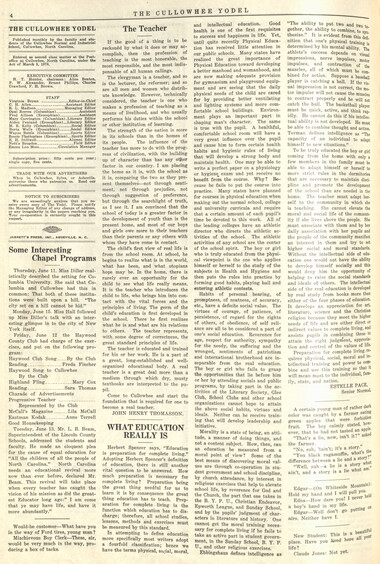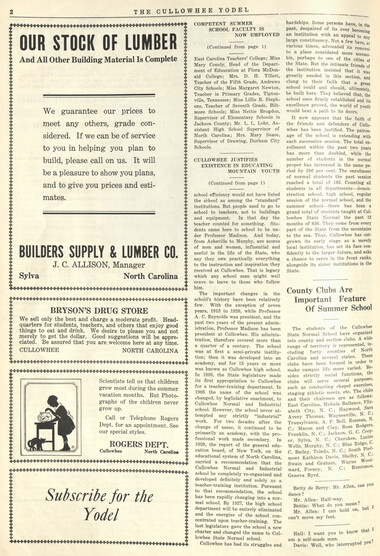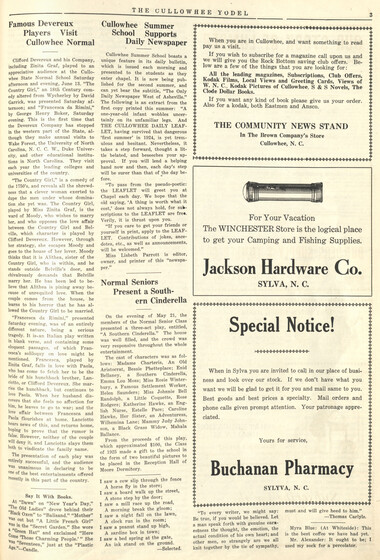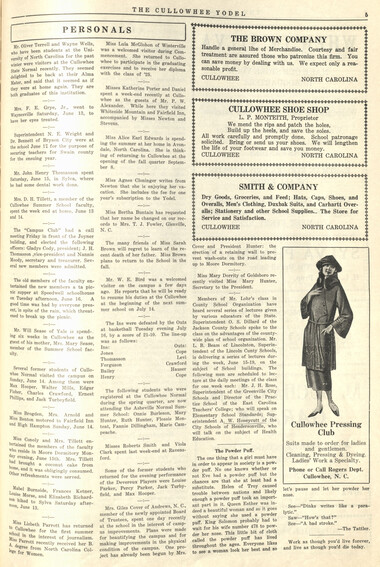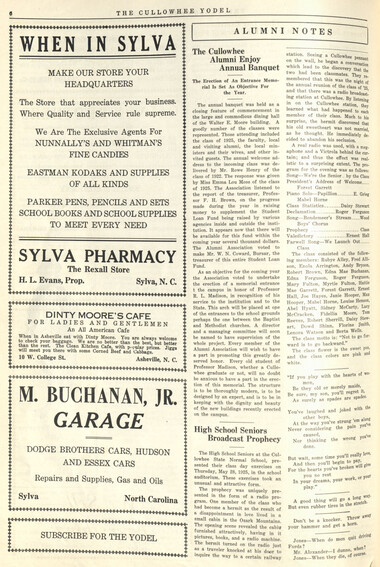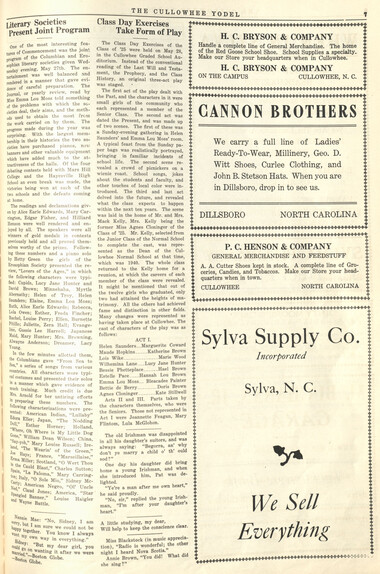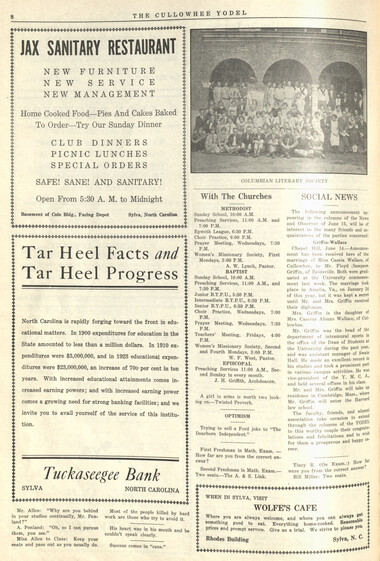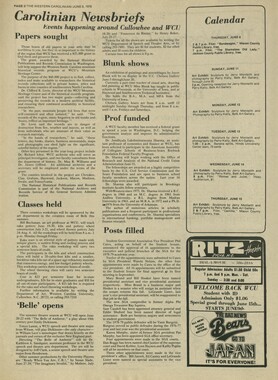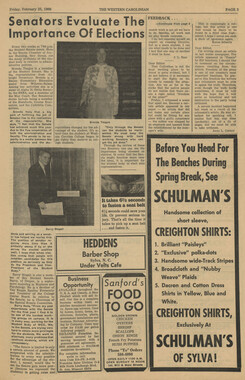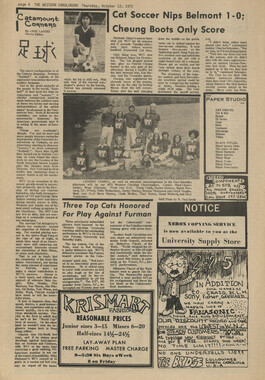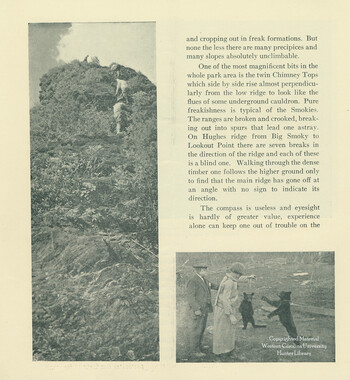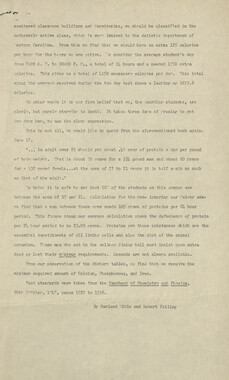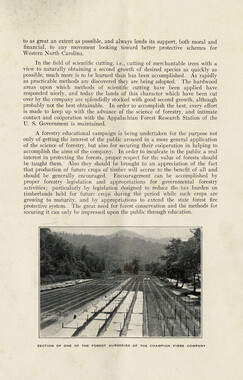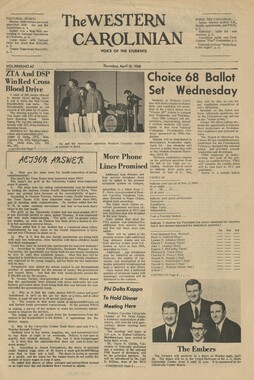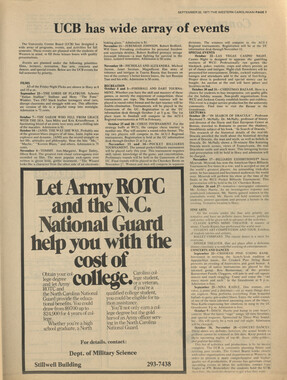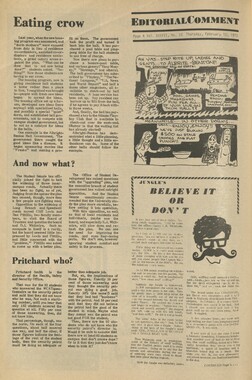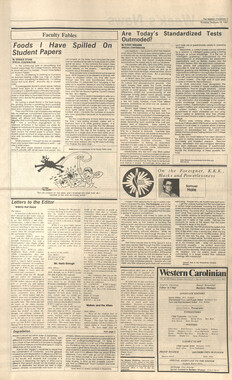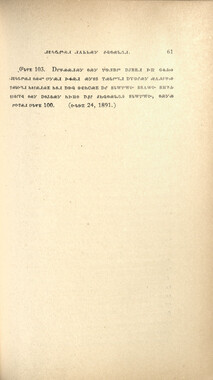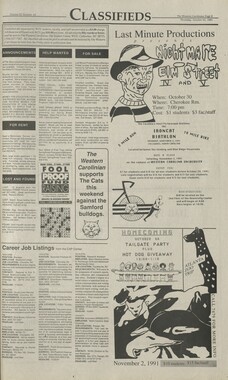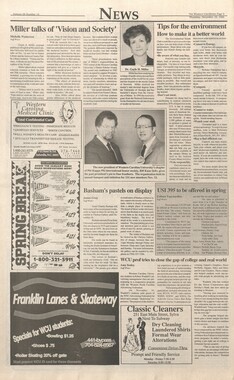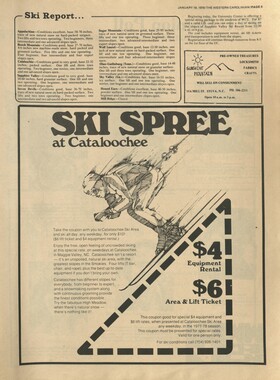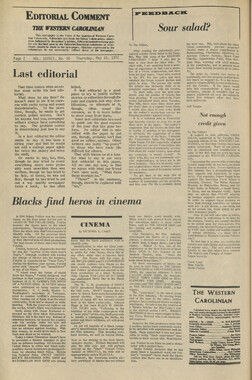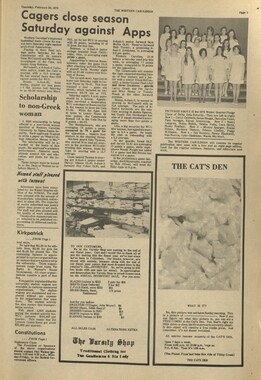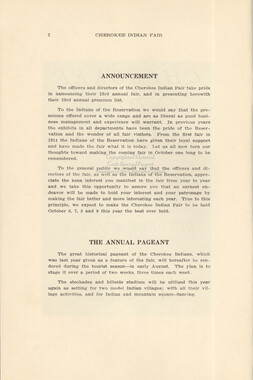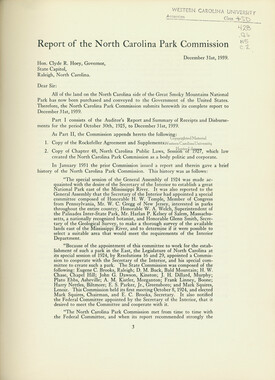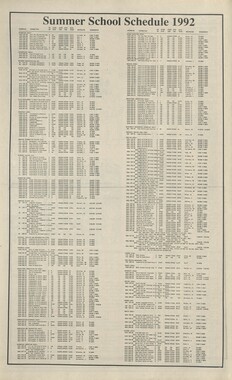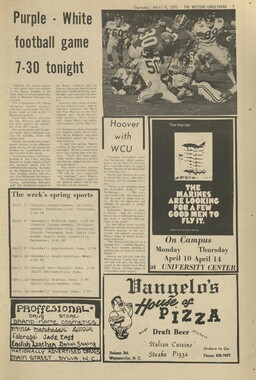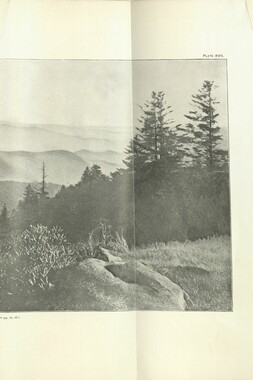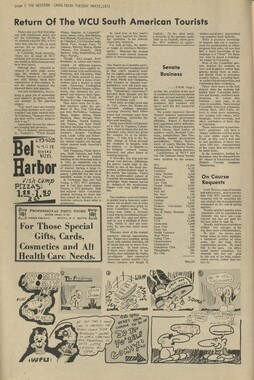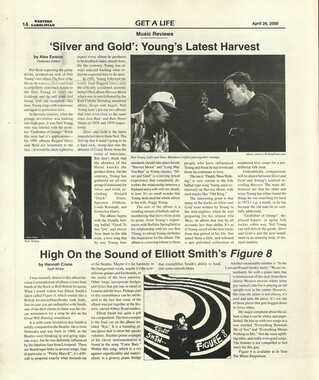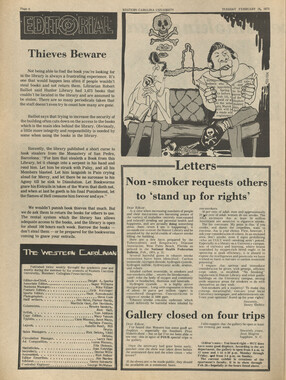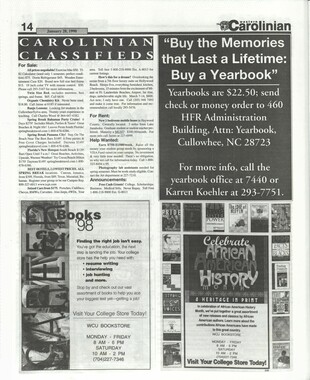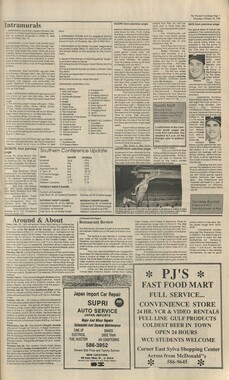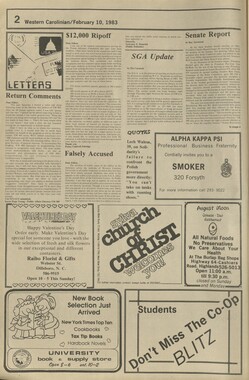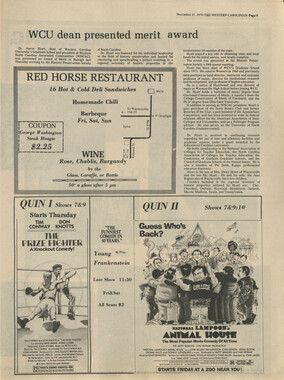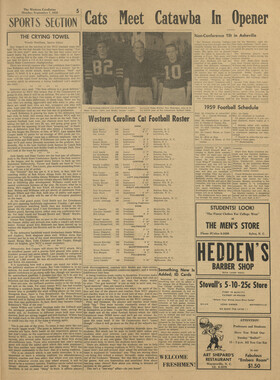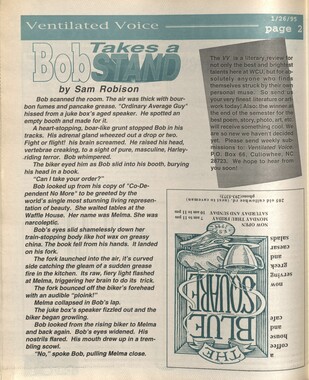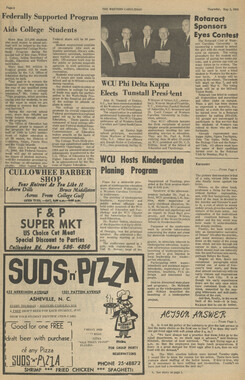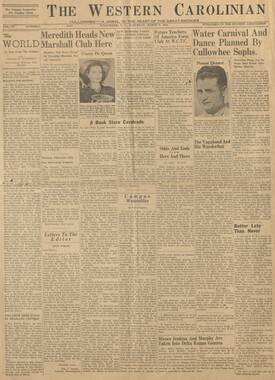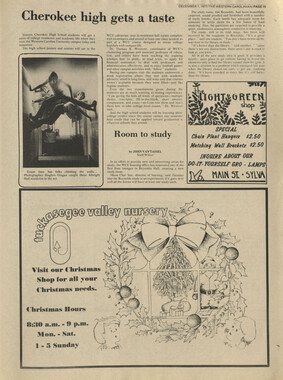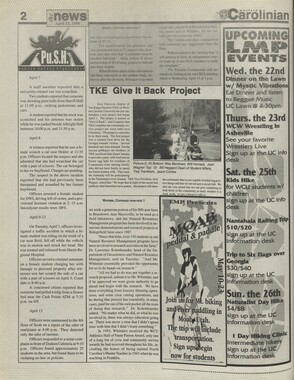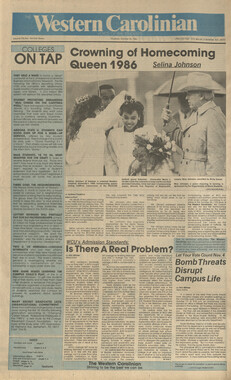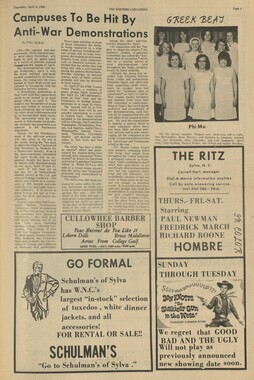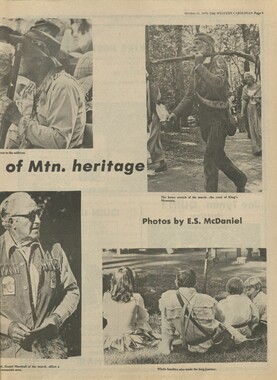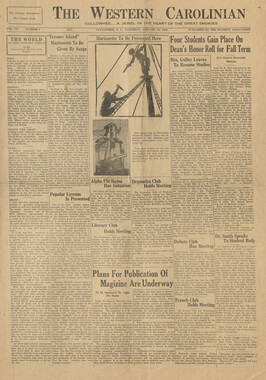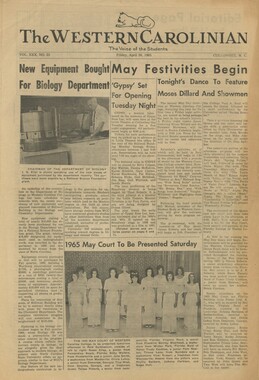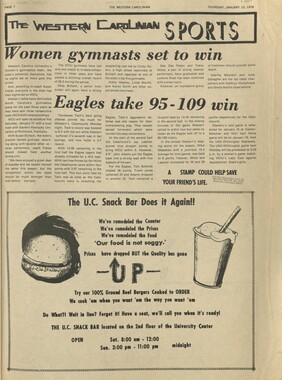Western Carolina University (20)
View all
- Canton Champion Fibre Company (2308)
- Cherokee Traditions (293)
- Civil War in Southern Appalachia (165)
- Craft Revival (1942)
- Great Smoky Mountains - A Park for America (2767)
- Highlights from Western Carolina University (430)
- Horace Kephart (941)
- Journeys Through Jackson (154)
- LGBTQIA+ Archive of Jackson County (27)
- Oral Histories of Western North Carolina (314)
- Picturing Appalachia (6772)
- Stories of Mountain Folk (413)
- Travel Western North Carolina (160)
- Western Carolina University Fine Art Museum Vitreograph Collection (129)
- Western Carolina University Herbarium (92)
- Western Carolina University: Making Memories (708)
- Western Carolina University Publications (2283)
- Western Carolina University Restricted Electronic Theses and Dissertations (146)
- Western North Carolina Regional Maps (71)
- World War II in Southern Appalachia (131)
University of North Carolina Asheville (6)
View all
- Western Carolina College (199)
- Western Carolina Teachers College (239)
- Western Carolina University (1792)
- Allanstand Cottage Industries (0)
- Appalachian National Park Association (0)
- Bennett, Kelly, 1890-1974 (0)
- Berry, Walter (0)
- Brasstown Carvers (0)
- Cain, Doreyl Ammons (0)
- Carver, George Washington, 1864?-1943 (0)
- Cathey, Joseph, 1803-1874 (0)
- Champion Fibre Company (0)
- Champion Paper and Fibre Company (0)
- Cherokee Indian Fair Association (0)
- Cherokee Language Program (0)
- Crittenden, Lorraine (0)
- Crowe, Amanda (0)
- Edmonston, Thomas Benton, 1842-1907 (0)
- Ensley, A. L. (Abraham Lincoln), 1865-1948 (0)
- Fromer, Irving Rhodes, 1913-1994 (0)
- George Butz (BFS 1907) (0)
- Goodrich, Frances Louisa (0)
- Grant, George Alexander, 1891-1964 (0)
- Heard, Marian Gladys (0)
- Kephart, Calvin, 1883-1969 (0)
- Kephart, Horace, 1862-1931 (0)
- Kephart, Laura, 1862-1954 (0)
- Laney, Gideon Thomas, 1889-1976 (0)
- Masa, George, 1881-1933 (0)
- McElhinney, William Julian, 1896-1953 (0)
- Niggli, Josephina, 1910-1983 (0)
- North Carolina Park Commission (0)
- Osborne, Kezia Stradley (0)
- Owens, Samuel Robert, 1918-1995 (0)
- Penland Weavers and Potters (0)
- Rhodes, Judy (0)
- Roberts, Vivienne (0)
- Roth, Albert, 1890-1974 (0)
- Schenck, Carl Alwin, 1868-1955 (0)
- Sherrill's Photography Studio (0)
- Smith, Edward Clark (0)
- Southern Highland Handicraft Guild (0)
- Southern Highlanders, Inc. (0)
- Stalcup, Jesse Bryson (0)
- Stearns, I. K. (0)
- Thompson, James Edward, 1880-1976 (0)
- United States. Indian Arts and Crafts Board (0)
- USFS (0)
- Vance, Zebulon Baird, 1830-1894 (0)
- Weaver, Zebulon, 1872-1948 (0)
- Western Carolina University. Mountain Heritage Center (0)
- Whitman, Walt, 1819-1892 (0)
- Wilburn, Hiram Coleman, 1880-1967 (0)
- Williams, Isadora (0)
- 1920s (57)
- 1930s (69)
- 1940s (114)
- 1950s (66)
- 1960s (314)
- 1970s (599)
- 1980s (406)
- 1990s (379)
- 2000s (195)
- 2010s (83)
- 1600s (0)
- 1700s (0)
- 1800s (0)
- 1810s (0)
- 1820s (0)
- 1830s (0)
- 1840s (0)
- 1850s (0)
- 1860s (0)
- 1870s (0)
- 1880s (0)
- 1890s (0)
- 1900s (0)
- 1910s (0)
- 2020s (0)
- Jackson County (N.C.) (2282)
- Appalachian Region, Southern (0)
- Asheville (N.C.) (0)
- Avery County (N.C.) (0)
- Blount County (Tenn.) (0)
- Buncombe County (N.C.) (0)
- Cherokee County (N.C.) (0)
- Clay County (N.C.) (0)
- Graham County (N.C.) (0)
- Great Smoky Mountains National Park (N.C. and Tenn.) (0)
- Haywood County (N.C.) (0)
- Henderson County (N.C.) (0)
- Knox County (Tenn.) (0)
- Knoxville (Tenn.) (0)
- Lake Santeetlah (N.C.) (0)
- Macon County (N.C.) (0)
- Madison County (N.C.) (0)
- McDowell County (N.C.) (0)
- Mitchell County (N.C.) (0)
- Polk County (N.C.) (0)
- Qualla Boundary (0)
- Rutherford County (N.C.) (0)
- Swain County (N.C.) (0)
- Transylvania County (N.C.) (0)
- Watauga County (N.C.) (0)
- Waynesville (N.C.) (0)
- Yancey County (N.C.) (0)
- Newsletters (510)
- Publications (documents) (1773)
- Aerial Photographs (0)
- Aerial Views (0)
- Albums (books) (0)
- Articles (0)
- Artifacts (object Genre) (0)
- Bibliographies (0)
- Biography (general Genre) (0)
- Cards (information Artifacts) (0)
- Clippings (information Artifacts) (0)
- Crafts (art Genres) (0)
- Depictions (visual Works) (0)
- Design Drawings (0)
- Drawings (visual Works) (0)
- Envelopes (0)
- Facsimiles (reproductions) (0)
- Fiction (general Genre) (0)
- Financial Records (0)
- Fliers (printed Matter) (0)
- Glass Plate Negatives (0)
- Guidebooks (0)
- Internegatives (0)
- Interviews (0)
- Land Surveys (0)
- Letters (correspondence) (0)
- Manuscripts (documents) (0)
- Maps (documents) (0)
- Memorandums (0)
- Minutes (administrative Records) (0)
- Negatives (photographs) (0)
- Newspapers (0)
- Occupation Currency (0)
- Paintings (visual Works) (0)
- Pen And Ink Drawings (0)
- Periodicals (0)
- Personal Narratives (0)
- Photographs (0)
- Plans (maps) (0)
- Poetry (0)
- Portraits (0)
- Postcards (0)
- Programs (documents) (0)
- Questionnaires (0)
- Scrapbooks (0)
- Sheet Music (0)
- Slides (photographs) (0)
- Songs (musical Compositions) (0)
- Sound Recordings (0)
- Specimens (0)
- Speeches (documents) (0)
- Text Messages (0)
- Tintypes (photographs) (0)
- Transcripts (0)
- Video Recordings (physical Artifacts) (0)
- Vitreographs (0)
- The Reporter, Western Carolina University (510)
- WCU Students Newspapers Collection (1744)
- A.L. Ensley Collection (0)
- Appalachian Industrial School Records (0)
- Appalachian National Park Association Records (0)
- Axley-Meroney Collection (0)
- Bayard Wootten Photograph Collection (0)
- Bethel Rural Community Organization Collection (0)
- Blumer Collection (0)
- C.W. Slagle Collection (0)
- Canton Area Historical Museum (0)
- Carlos C. Campbell Collection (0)
- Cataloochee History Project (0)
- Cherokee Studies Collection (0)
- Daisy Dame Photograph Album (0)
- Daniel Boone VI Collection (0)
- Doris Ulmann Photograph Collection (0)
- Elizabeth H. Lasley Collection (0)
- Elizabeth Woolworth Szold Fleharty Collection (0)
- Frank Fry Collection (0)
- George Masa Collection (0)
- Gideon Laney Collection (0)
- Hazel Scarborough Collection (0)
- Hiram C. Wilburn Papers (0)
- Historic Photographs Collection (0)
- Horace Kephart Collection (0)
- Humbard Collection (0)
- Hunter and Weaver Families Collection (0)
- I. D. Blumenthal Collection (0)
- Isadora Williams Collection (0)
- Jesse Bryson Stalcup Collection (0)
- Jim Thompson Collection (0)
- John B. Battle Collection (0)
- John C. Campbell Folk School Records (0)
- John Parris Collection (0)
- Judaculla Rock project (0)
- Kelly Bennett Collection (0)
- Love Family Papers (0)
- Major Wiley Parris Civil War Letters (0)
- Map Collection (0)
- McFee-Misemer Civil War Letters (0)
- Mountain Heritage Center Collection (0)
- Norburn - Robertson - Thomson Families Collection (0)
- Pauline Hood Collection (0)
- Pre-Guild Collection (0)
- Qualla Arts and Crafts Mutual Collection (0)
- R.A. Romanes Collection (0)
- Rosser H. Taylor Collection (0)
- Samuel Robert Owens Collection (0)
- Sara Madison Collection (0)
- Sherrill Studio Photo Collection (0)
- Smoky Mountains Hiking Club Collection (0)
- Stories of Mountain Folk - Radio Programs (0)
- Venoy and Elizabeth Reed Collection (0)
- WCU Gender and Sexuality Oral History Project (0)
- WCU Mountain Heritage Center Oral Histories (0)
- WCU Oral History Collection - Mountain People, Mountain Lives (0)
- Western North Carolina Tomorrow Black Oral History Project (0)
- William Williams Stringfield Collection (0)
- Zebulon Weaver Collection (0)
- College student newspapers and periodicals (1769)
- African Americans (0)
- Appalachian Trail (0)
- Artisans (0)
- Cherokee art (0)
- Cherokee artists -- North Carolina (0)
- Cherokee language (0)
- Cherokee pottery (0)
- Cherokee women (0)
- Church buildings (0)
- Civilian Conservation Corps (U.S.) (0)
- Dams (0)
- Dance (0)
- Education (0)
- Floods (0)
- Folk music (0)
- Forced removal, 1813-1903 (0)
- Forest conservation (0)
- Forests and forestry (0)
- Gender nonconformity (0)
- Great Smoky Mountains National Park (N.C. and Tenn.) (0)
- Hunting (0)
- Landscape photography (0)
- Logging (0)
- Maps (0)
- Mines and mineral resources (0)
- North Carolina -- Maps (0)
- Paper industry (0)
- Postcards (0)
- Pottery (0)
- Railroad trains (0)
- Rural electrification -- North Carolina, Western (0)
- School integration -- Southern States (0)
- Segregation -- North Carolina, Western (0)
- Slavery (0)
- Sports (0)
- Storytelling (0)
- Waterfalls -- Great Smoky Mountains (N.C. and Tenn.) (0)
- Weaving -- Appalachian Region, Southern (0)
- Wood-carving -- Appalachian Region, Southern (0)
- World War, 1939-1945 (0)
- Text (2283)
- MovingImage (0)
- Sound (0)
- StillImage (0)
Cullowhee Yodel Volume 02 Number 05
Item
Item’s are ‘child’ level descriptions to ‘parent’ objects, (e.g. one page of a whole book).
-
-
THE CULLOWHEE YODEL THE CULLOWHEE YODEL The Teacher Publ.shed monthly by the faculty and stu- __ ;, , . ,,• „ ;. t„ I. dents o£ the Cullowhee Normal and Industrial If the good of a thing IS to De School, Cui-owhee, North Carolina. reckoned by what it does or may ac- complish, then the profession of office _t CuTiowheT. North Carolina,* under "the teaching is the most honorable, the Act of March s, 1879. most responsible, and the most indis- — ~ pensable of all human callings. H. T. ^^ffl™ Benton, The clergyman is a teacher, and so P. w. Alexander, Ernest Phillips, Charles js tne lecturer, the reformer; and so ' are all men and women who distrib- STAFF ~ ute knowledge. However, technically Virginia Bryan Editor-in-Chief considered, the teacher is one who R. L.' uJLT" M-i-^g Edit-r makes a profession of teaching as a FrPe. Xon'^E^phian)::::::::::^^ means of livelihood, and who usually Mary Carrington (Co a Editor performs his duties within the school Alden Penland (Erosophian)._Literary Editor * ,, ________ . , M. E. Kelly (Columbian) Social Editor or other institution of learning. W___« Baltle fcX^bianlZIIIZZlports BitoJ The stren^th °f the nati°n iS m°^ Bessie Phetteplace (Erosophian)_„Sports Editor in its schools than in the homes of K. li. Stillwell Alumni Editor .± , m, . ,. e ... Nettie Brogdon Field Editor its people. The influence of the Emma Lou Moss Circulation Manager teacher has more to do with the prog- ==^^==^===^=^ ress 0f civilization, with the building sin3g1eScopy!°fivePrcienta. fi"y "'' per year' UP of character than has any other ' factor in our country. I am placing trade with our advertisers the home as it is, with the school as When in Cullowhee, Sylva, or Asheville, it is, comparing the two as they pre- a^ttemenur Wh° patTOIiiz'! us" Read our sent themselves'-not through senti- _____________________________________ ment, not through prejudice, not notice to subscribers through suggestion of preference, We are exceedingly anxious that you re- but through the searchlight of truth, ceive every copy of The Yodel. Please notify T ., T , ,. . ., th» Managing Editor of any change of address, as I See it. I am Convinced that the Touarnyco!orpera«ony Is" l^T^Tn S_ Sch°o1 °f tod^ JS S *"*ter faCt°r fa respect. the development of youth than is the present home, and most of our boys and girls owe more to their teachers than their parents or any others with whom they have come in contact. Some Interesting The child's first view of real life is fyi I -j-j from the school room. At school, he Chapel rrOgramS begins to realize what is in the world, what has been, and what Utopians Thursday, June 11. Miss Diller real- hope may be. in the home, there is istically described the setting for Co- rarely ever an opportunity for the lumbia University. She said that Co- child to see what life really means, lumbia and Cullowhee had this in It is the teacher who introduces the common: That both of these institu- child to life, who brings him into con- tions were built upon a hill. "The tact with the vital forces and the city set on a hill cannot be hid." principles of living. The germ of the Monday, June 15. Miss Hall followed child-s education is first developed in up Miss Diller's talk with an inter- the school. There he first realizes esting glimpse in to the city of New what he is and what are his reiations York itself. to others. The teacher represents, Friday, June 12 the Haywood wlth some degree of correctness, the County Club had charge of the exer- _reat standard principles of life, cises, and put on the following pro- The teacher is educated and trained £ram: for his or her work. He is a part of Haywood Club Song__ By the Club a great; long-established and well- Reading Freda Fincher organized educational body. A real Haywood Song to Cullowhee teacher is a great deal more than a By the Club medium through which dry, musty Highland Flings Mary Cox textbooks are interpreted to the pu- Reading Sara Thomas »jj Charade of Advertisements Come to Cullowhee and start the Progressive Teacher foundation that is required for one to Represented by the Club become _ real teacher. McCall's Magazine Lila McCall JOHN HENRY THOMASSON. Eastman Kodak _ Anne Terrell Good Housekeeping ..t.-. ■ -., _--^.-^, . „,-.~__ Tuesday, June 13. Mr. L. B. Beam, WHAT EDUCATION Superintendent of the Lincoln County REALLY IS Schools, addressed the students and faculty. He made an eloquent plea Herbert Spencer says, "Education for the cause of equal education for is preparation for complete living." "All the children of all the people of Adopting Herbert Spencer's definition North Carolina." North Carolina of education, there is still another needs an educational revival more vital question to be answered. How now than ever before, declared Mr. much preparation is necessary for Beam. This revival will take place complete living? Preparation being when every teacher has caught the the great thing needful for us to vision of his mission as did the great- lea™ it is by consequence the great est Educator long ago:" I am come thing education has to teach. Prep- that ye may have life, and have it aration for complete living is the more abundantly." function which education has to discharge; therefore, all school studies, lessons, methods and exercises must be measured by this standard. In attempting to define education more specifically most writers adopt a fourfold classification; hence we have the terms physical, social, moral, Would-be customer—What have you in the way of Ford tires, young man ? Mischievous Boy Clerk—These, sir, would be very much in the way, producing a box of tacks. and intellectual education. Good health is one of the first requisites to success and happiness in life. Yet, until quite recently Physical Education has received little attention in our public schools. Many states have realized the great importance of Physical Education toward developing a better manhood and womanhood, and are now making adequate provision for gymnasium and playground equipment and are seeing that the daily physical needs of the child are cared for by providing better ventilating and lighting systems and more comfortable school buildings. Environment plays an important part in shaping man's character. The same is true with the pupil. A healthful, comfortable school room will have a very great influence over the pupil and cause him to form certain health habits and hygienic rules of living that will develop a strong body and maintain health. One may be able to write a perfect paper on a physiology or hygiene^ exam and yet receive no benefit from the course. Why? Because he fails to put the course into practice. Many states have planned for courses in physical education when making out the normal school, college and university curricula and require that a certain amount of each pupil's time be devoted to this work. All of the leading colleges have an athletic director who directs the athletic activities of the school. The athletic activities of any school are the center of the school spirit. The boy or girl who is truly educated from the physical viewpoint is the one who applies himself or herself to the study of the subjects in Health and Hygiene and then puts the rules into practice by forming good habits, playing ball and entering athletic contests. Habits of personal bearing, of promptness, of neatness, of accuracy, etc., have a definite social value. The virtues of courage, of patience, of persistence, of regard for the rights of others, of obedience, of self reliance are all to be considered a part of one's social education. Reverence for age, respect for authority, sympathy for the needy, the suffering and the wronged, sentiments of patriotism and international brotherhood are inseparable from the real education. The boy or girl who fails to grasp the opportunities that lie before him or her by attending socials and public programs, by taking part in the activities of the Literary Society, Glee Club, School Clubs and other school organizations cannot hope to attain the above social habits, virtues and ideals. Neither can he receive training that will develop leadership and initiative. Morality is a state of being, an attitude, a manner of doing things, and not a content subject. How, then, can an education be measured from a moral point of view? Some of the best means of discovering moral values are through co-operation in student government and school discipline, by church attendance, by interest in religious exercises that help to elevate school life, by reverence for God and the Church, the part that one takes in the B. Y. P. U., Christian Endeavor, Epworth League, and Sunday School, and by the pupils' judgment of characters in literature and history. One cannot get the moral training necessary for complete living if he fails to take an active part in student government, in the Sunday School, B. Y. P. U., and other religious exercises. Ebbingshaus defines intelligence as "The ability to put two and two to gether, the ability to combine, to syn~ thesize." It is evident from this defi' nition that one's physical training is determined by his mental ability The athlete's success depends on visual impressions, nerve impulses, motor impulses, and contraction of the muscles, all of which must be combined for action. Suppose a baseball player is catching a ball. If tns vis- ual impression is not correct, the motor impulse will not cause the muscles to contract properly and he will not catch the ball. The basketball player must be quick, active, and think rapidly. He cannot do this if his intellectual ability is not developed. He must be able to combine thought and action. Terman defines intelligence as "The capacity of an individual to adapt himself to new situations." To be truly educated the boy or girl coming from the home with only a few members in the family must be able to adapt himself or herself to more strict rules in the dormitories that are necessary to maintain discipline ami promote the development of the school than are needed in the home. The teacher must adapt herself to the cummunity in which she is teaching. She cannot elevate the moral and social life of the community if she lives above the people. She ,must associate with them and by her daily association with her pupils and the people of the community manifest an interest in them and try to set higher social and moral standards. Without the intellectual side of education one would not have the ability to develop himself socially and this would deny him the opportunity of helping to raise the social standards Uld ideal of others. The intellectual side of the real education is developed by real study from books more than either of the four phases of education. It develops an appreciation for art, literature, science and the Christian religion because they meet the higher life and are either director indirect values to complete living, and assists pupils in combining these to attain the right judgment, appreciation and control of the values of life. Preparation for complete living.requires physical, social, moral and intellectual training and power to combine and use this training so that it will mean most to the individual, family, state, and nation. ESTELLE PACE, Senior Normal. A certain young man of rather dark color was caught by a farmer eating green apples that were forbidden fruit. The boy calmly stated, however, that be bad not tasted an appi ■ "That's a lie, now, isn't it?" asked the farmer. „ "No, suh. 'tain't; it's a story. "You black ragamuffin, whats » difference between a lie and a story- "Well, suh-a lie is a story *hnt ain't, and a story is a lie whut am. Edgar-(On Whiteside Mount am). Hold my hand and I will pull y°u. Edna-How dare you! I never held a boy's hand in my life. on Edgar-Well don't go putting airs. Neither have I. New Student: This is a beaut^ place. Have you lived here all y life? Claude Jones: Not yet.
Object
Object’s are ‘parent’ level descriptions to ‘children’ items, (e.g. a book with pages).
-
The Western Carolinian is Western Carolina University’s student-run newspaper. The paper was published as the Cullowhee Yodel from 1924 to 1931 before changing its name to The Western Carolinian in 1933.
-
